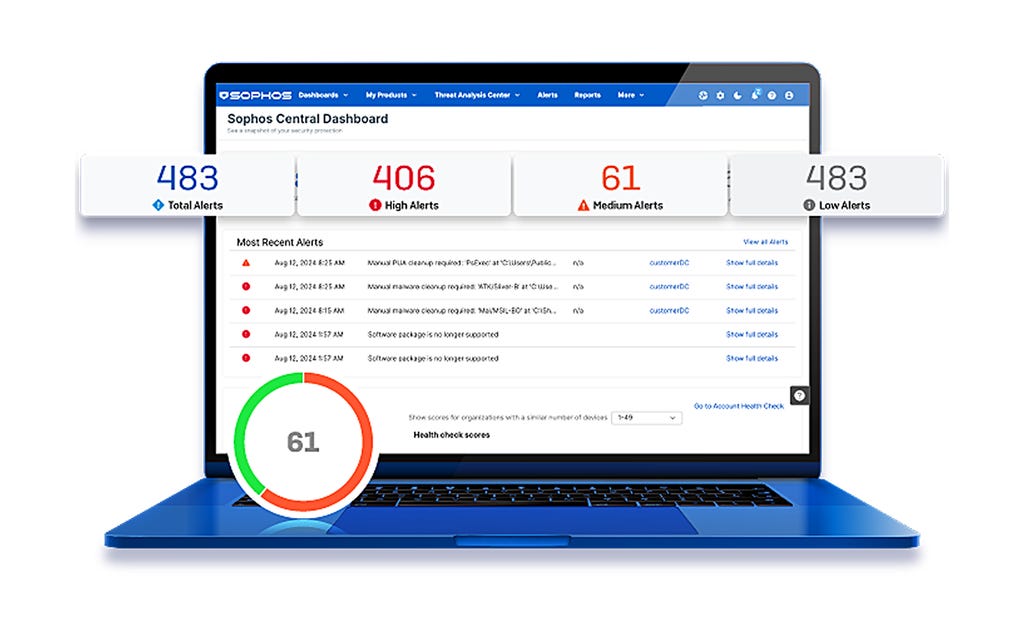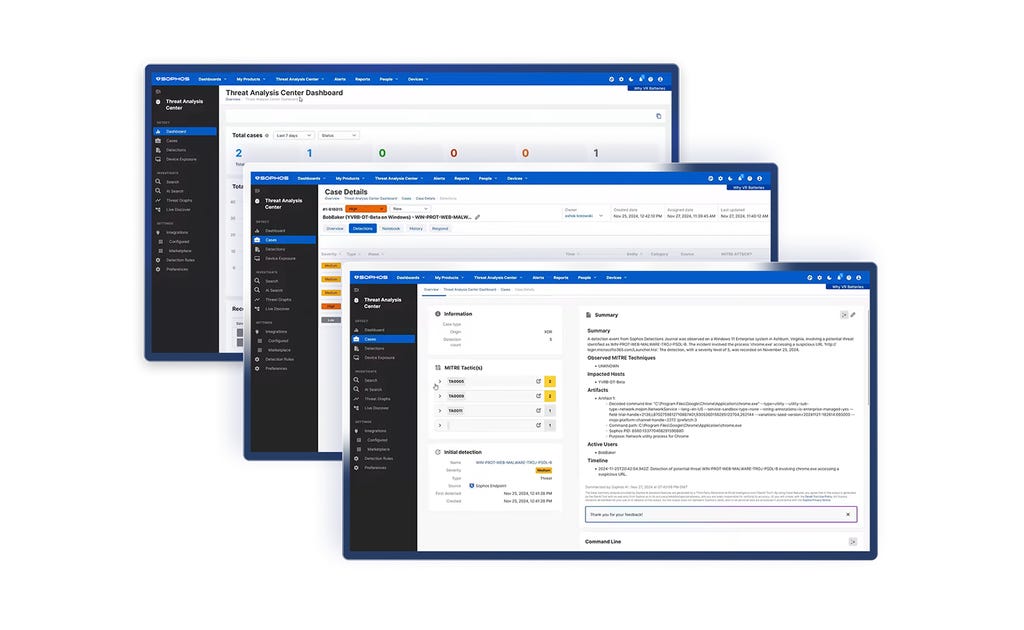
Adaptive AI-Native Cybersecurity Platform
Tome el control de todo tipo de amenazas
Sophos combina información sobre amenazas sin igual, IA adaptativa y experiencia humana en una plataforma abierta para detener los ataques antes de que se produzcan, lo que le da la claridad y la confianza necesarias para adelantarse a cualquier amenaza.

Sophos Firewall
Ya está disponible Sophos Firewall v22
Sophos Firewall v22 lleva la arquitectura "Secure by Design" a un nivel completamente nuevo
New Sophos Workspace Protection
Proteja a los empleados remotos e híbridos
MANAGED DETECTION & RESPONSE
Ciberamenazas neutralizadas 24/7
Defensa de primera línea 24/7, basada en IA, información sobre amenazas y un equipo de expertos, en la que confían más de 35 000 organizaciones.
Adaptive AI-Native Cybersecurity Platform
Tome el control de todo tipo de amenazas
Sophos combina información sobre amenazas sin igual, IA adaptativa y experiencia humana en una plataforma abierta para detener los ataques antes de que se produzcan, lo que le da la claridad y la confianza necesarias para adelantarse a cualquier amenaza.
Sophos Firewall
Ya está disponible Sophos Firewall v22
Sophos Firewall v22 lleva la arquitectura "Secure by Design" a un nivel completamente nuevo
New Sophos Workspace Protection
Proteja a los empleados remotos e híbridos
MANAGED DETECTION & RESPONSE
Ciberamenazas neutralizadas 24/7
Defensa de primera línea 24/7, basada en IA, información sobre amenazas y un equipo de expertos, en la que confían más de 35 000 organizaciones.

Derrote los ciberataques
Tecnología de clase mundial y experiencia del mundo real, siempre sincronizadas, siempre a su lado. Todos salimos ganando.
Una protección resiliente y una plataforma adaptativa nativa de IA para detener los ataques antes de que se produzcan
Un equipo de expertos en MDR especializados en la búsqueda de amenazas las encuentran y neutralizan con precisión y rapidez
Defensa sin precedentes en toda la superficie de ataque: endpoints, firewall, correo electrónico y la nube
Los profesionales de la seguridad recomiendan Sophos
.webp?width=120&quality=80&format=auto&cache=true&immutable=true&cache-control=max-age%3D31536000)


.webp?width=440&quality=80&format=auto&cache=true&immutable=true&cache-control=max-age%3D31536000)
.webp?width=360&quality=80&format=auto&cache=true&immutable=true&cache-control=max-age%3D31536000)
Detenga las amenazas antes de que le ataquen
Con Sophos, la IA evoluciona al ritmo de las amenazas y a los expertos no se les escapa nada, para que pueda crecer con confianza. Descubra cómo protegemos su negocio.

La plataforma de ciberseguridad adaptativa nativa de IA
Sophos Central ofrece una protección inigualable a los clientes y potencia la capacidad de los defensores. Esta plataforma nativa de IA, la más amplia del sector, combina unas defensas dinámicas, una IA probada en situaciones reales y un ecosistema rico en integraciones.
Soluciones a sus retos de seguridad
Cómo las empresas se
protegen con Sophos

.webp?width=980&quality=80&format=auto&cache=true&immutable=true&cache-control=max-age%3D31536000)
Sophos X-Ops
Benefíciese de nuestra amplia experiencia en todo el entorno de ataque para protegerse de los adversarios más avanzados.
Eventos y formación
Asista a nuestros eventos en directo o vea nuestros webinars bajo demanda para conocer las últimas tendencias del sector y las oportunidades de negocio de la mano de nuestros expertos en ciberseguridad. Consulte nuestra formación para desarrollar las competencias y los conocimientos necesarios para derrotar los ciberataques.
.svg?width=185&quality=80&format=auto&cache=true&immutable=true&cache-control=max-age%3D31536000)


.svg?width=13&quality=80&format=auto&cache=true&immutable=true&cache-control=max-age%3D31536000)























.png&w=1920&q=75)

.png&w=1920&q=75)

.png&w=1920&q=75)

